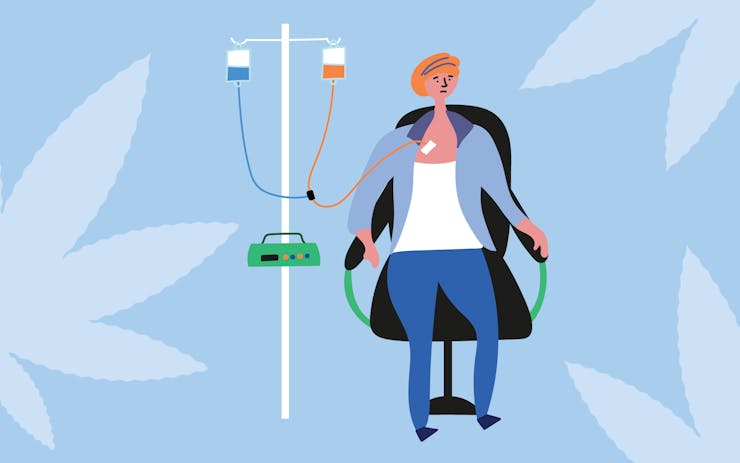These days, you’re more likely than ever to hear cannabis and cancer mentioned in the same breath. Cannabis is already recognized as a valuable palliative treatment for cancer due to its antiemetic and analgesic effects. Emerging research suggests that cannabis may offer curative benefits for cancer, too—cannabinoids present in the plant can prevent the proliferation of cancer cells, slow tumor growth, or even stimulate the death of cancer cells.
While the addition of cannabis to the cancer-fighting arsenal is a cause to celebrate, the complexities of cannabis and cancer interactions are still not fully understood. Scientists are still making sense of the role the endocannabinoid system plays in the development of cancer and whether certain cannabinoids may stimulate cancer cell proliferation.
Most critically, today, little is known about the connections between cancer, the immune system, and cannabis. A 2019 retrospective observational paper suggests that cannabis may be detrimental to cancer patients undergoing immunotherapy; nowadays, immunotherapy is a standard of care for many solid tumors.
Cannabinoids May Suppress the Immune System
“The way immunotherapy works is by using certain drugs, such as Nivolumab, to stimulate the immune system to help kill cancer cells,” explains Dr. Chanda Macias, Ph.D. and CEO of the National Holistic Healing Center. Immunotherapy harnesses compounds created by the body or synthesized in a laboratory to improve or restore immune system function, to stop or slow the growth of cancerous cells.
Macias has a research background in molecular and cellular biology and has spent more than 15 years working with medicinal marijuana. While she recognizes the potential of cannabis as a cancer treatment, she cautions that combining immunotherapy and cannabis may be problematic.
“Compounds in cannabis have been found to have an immunomodulatory effect,” says Macias. Immunomodulation downregulates the intensity or duration of an immune response, and can even increase the threshold required to kickstart immunoactivity.
This property renders cannabis ideal for the treatment of inflammation or autoimmune diseases characterized by immune system overactivity. For cancer patients undergoing immunotherapy, however, not so helpful.
Certain cannabinoids appear to fire up regulatory T cells, leading to immunomodulation and the inhibition of immune responses, which can dull the effects of immunotherapy—the treatment which aims to put the immune system into high gear to battle cancerous cells.
THC is a known immunomodulator. But CBD, the cannabinoid currently on everyone’s mind, may also present issues for immunotherapy. “There is a potential for CBD to cause a similarly reduced response, as CBD also reduces inflammation and may interfere with stimulating the body’s immune response for immunotherapy,” explains Macias.
More Research on Cannabis and Cancer Is Needed
While research into the topic is still scant, studies such as the retrospective paper mentioned above have turned up concerning findings: Patients who did not receive cannabis were 3.17 times more likely to respond to immunotherapy.
Shop highly rated dispensaries near you
Showing you dispensaries nearThe study analyzed data from the medical charts of 140 patients. The patients reviewed had been diagnosed with three types of cancer: melanoma, non-small-cell lung cancer, and renal cell carcinoma. All underwent treatment with Nivolumab, a common immunotherapy drug.
Eighty-nine patients received Nivolumab, while 51 patients received Nivolumab in conjunction with medical cannabis. The second group, who received medical cannabis, experienced lower response rates to immunotherapy (37.5% vs. 15.9%).
Patients with renal cell carcinoma and melanoma showed a particularly pronounced disparity: 40.6% of patients who received Nivolumab alone responded to the treatment, in contrast to 10% of patients who received cannabis and Nivolumab. The route, dose, and formula of cannabis did not appear to impact the response rate. Statistical analysis reveals that cannabis was the only significant factor which could have reduced the response rate to immunotherapy.
However, the study also unveiled some fascinating quirks. While the response rate to immunotherapy was affected by cannabis use, other measures such as progression-free survival and overall survival were not—progression-free survival refers to the length of time during and after treatment that a patient lives with the disease without it worsening; overall survival is the length of time a patient stays alive from the date of diagnosis or commencement of treatment.
While the study has limitations—a small sample size and short follow-up period—it nonetheless highlights that both physicians and patients need to be aware of the potentially negative effects of cannabis on immunotherapy treatment.
Dr. Macias echoes this sentiment: “Caution may be required when starting immunotherapy combined with medical cannabis use to ensure that immunotherapy is not affected by the anti-inflammatory properties of medical cannabis.”





